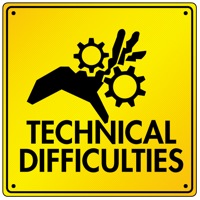Generational Technical Difficulties

If you’ve been listening to Generational, first, I want to say thanks. I consider the show a glorious success. I was able to chat with some of my favorite people, get some terrific feedback, and learn about the world of podcasting from the other end of the microphone. All of this was made possible by Myke Hurley and Michael Schechter. They needled me into doing it in the first place and Myke gave it a home on 70Decibels. What a thrill.
I have what I consider a serious personality flaw though. I don’t like to follow well trodden paths, be they other’s or my own. I think that the difficult paths are the ones full of great lessons and new diversions. Almost every goal I reach has been followed by a swift desire to tear it apart. I guess I just spent too much of my childhood with Legos.1
Through Generational’s first year, the show evolved in fits and spurts. The show intro changed and app-picks were cut from the end. The best change was the addition of Erik Hess as the co-host. Erik is incredibly smart and talented. He also has a unique perspective that I think nicely contrasts with mine. While I am quick to a conclusion, Erik gathers his perspective slowly. I like smart people that disagree with me.
It may have not been obvious to all of the listeners, but it was painfully obvious to me that I prepared less as the shows went on.2 I initially told myself that less preparation was better for the show. I told myself that spontaneity was better than studying. I was a liar.
While our guests continued to be phenomenal, I regularly fell down in my own expectations. I failed to utilize the wonderful opportunities I was afforded and it weighed heavy on me; So heavy that I wanted to quit.

Erik convinced me to salvage the core of Generational and make it something that I could be proud of. After many machinations and this lengthy, self-obsessed preamble, I am happy to announce Technical Difficulties.
The Shows
We struggled with three aspects of the original shows:
- Two hour shows need to provide two hours of interest
- Guests are like snowflakes; They are special, unique and hard as hell to schedule a recording session when you also have a day job
- Show notes need to provide real value or it’s just a waste of everyone’s time
Erik and I planned Technical Difficulties for months. We also looked around at the current state of podcasting to steal what we liked and avoid what annoyed us.
Technical Difficulties is about solving problems.
Most of the shows will be Erik and I discussing a specific problem. The first episode is a good example where we discuss the difficulty of building a home Ethernet environment. We’re not experts but we hold a high standard for ourselves and have made a few notches on our nerd-belt over the years.
Most of the shows will be under 30 minutes. Get in, get out and maybe stimulate some new endeavors.
The Show Notes
Show notes are a pet peeve of mine. Maybe it’s because I read a lot of technical blogs, but I feel like show notes can be so much more than what they are today. Somehow we have collectively agreed that written and spoken words are antitheses.
Technical Difficulties is two parts. It is a podcast where Erik and I (and occasionally a guest) talk about something that is hard. It is also a blog where the same topic is elaborately defined and deconstructed. If you just listen to the podcast, then we hope you feel satisfied. If you just read the blog posts, then you’ll be pretty set on the topic. If you do both, well, we hope that’s the sweet spot. I highly recommend you do both.
We believe in this new format so much, that we have two feeds for this podcast. This one is for the audio podcasts: http://technicaldifficulties.us/itunes
This one is just for the blog posts: http://technicaldifficulties.us/feed
The Website
I think Erik has impeccable taste.3 He built the Technical Difficulties Web site by hand and I think it’s fantastic. My personal favorite is the gallery view of the shows. Erik has allocated a single and incredibly appropriate image for each episode. The gallery view lets you view all of them without being distracted by the actual show topic.
Seriously, look at that site! It’s damn gorgeous. Holy hell, I’m glad I don’t have good taste and high standards. The rest of the Internet must suck for guys like Erik.
The other thing you might notice is that we are embedding the SoundCloud player with each blog post. SoundCloud provides one of the best inline players around. It can play in the background on iOS and doesn’t require flash. But it stinks with HuffDuffer. If that’s your thing, then you can use the regular link on the same page. It uses our current CDN, Buzzsprout.
Networks
One of the best things to happen to podcasting in recent years has been the consolidation of interesting shows into networks. The TWIT network was the trail blazer, followed by Revission3, 5by5, 70 Decibels and Mule Radio. Networks are good for listeners and podcasters. They give listeners a platform for discovering new broadcasts and they give podcasters visibility and the attention of advertisers.
Technical Difficulties is a personal experiment and an imminent failure. Erik, Potato and I wanted the flexibility to do dumb things. We want to do something really different and that just would not fit with a network right now. We will try to bring along our existing listeners, but getting new listeners will be harder without a network. It’s a risk we are willing to take.
We will rely solely on you. Word of mouth and iTunes ratings are the best way you can help us. We’re not asking for memberships or Kickstarter donations. We’re asking for the hard kind of support. The kind that takes some effort.
If you don’t make stuff and sell it through Apple, it’s easy to underestimate how important ratings are. Developers and producers would like to think that most people writing ratings are pre-literate knuckle-draggers without the slightest value system. The truth is that there’s a wide distribution and ratings still point toward a trend. That’s exactly why people check the ratings. Good ratings mean more people know about our show. If more people know about the show, it’s easier for us to get guests. That’s better for everyone. Go rate a show you like!
Enjoy the Show
Erik, Potatowire and I worked hard to re-imagine Generational and what we wanted to do with podcasting. The first year of Generational was a great experiment. We think this next year of Technical Difficulties will be a something equally rewarding. If you like what we’re doing, please share it with someone you like.
-
The real kind, without a step-by-step instruction manual and Ikea-style pictograms. Damn kids. ↩︎
-
For about half of the Generational run, my show notes were a thing of beauty. I crafted elaborate context maps and outlines that actually worked. They allowed me to guide conversations to the exact points I was interested in. They helped me understand my guest and topic but also gave me a foundation that allowed me to comfortably be myself. ↩︎
-
Except for his taste in watches. ↩︎
